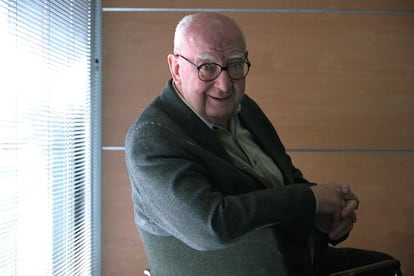Movie director José Luis Borau dies at 83
Zaragoza-born filmmaker directed key 1970s work ´Furtivos’ and threw himself into a host of other projects

Spanish filmmaker José Luis Borau, responsible for such works as Furtivos (1975) and Leo (2000), died on Friday at the age of 83, the Royal Spanish Academy, of which he was a member, has announced. A man of many gifts, Borau was also a teacher, a writer, a former president of the Cinema Academy and the SGAE royalties management agency, a board member at the Reina Sofía Museum and the creator of a foundation to help aspiring filmmakers.
Cinema, however, was always his first love. Born in Zaragoza in 1929, he made his directorial debut with the western Brandy in 1964, later creating one of the key works of the Transition with Furtivos. He also spent almost a decade living in the United States where in 1984 he made Río abajo, another western and a box-office failure that nevertheless showed his mad genius and empathy for those living on the margins. His final feature was Leo in 2000, which starred actress and director Iciar Bollain.
After successfully undergoing surgery for cancer of the esophagus two years ago, Borau had gradually retreated from public life, confining himself to his home and no longer giving interviews.
A screenwriter, director, producer, actor, he always liked to say that he had done nothing else in his life apart from watch and read about movies, a trade which he compared with the art of seduction: "One makes cinema like one makes love. However you can," he once said.
Tu suscripción se está usando en otro dispositivo
¿Quieres añadir otro usuario a tu suscripción?
Si continúas leyendo en este dispositivo, no se podrá leer en el otro.
FlechaTu suscripción se está usando en otro dispositivo y solo puedes acceder a EL PAÍS desde un dispositivo a la vez.
Si quieres compartir tu cuenta, cambia tu suscripción a la modalidad Premium, así podrás añadir otro usuario. Cada uno accederá con su propia cuenta de email, lo que os permitirá personalizar vuestra experiencia en EL PAÍS.
¿Tienes una suscripción de empresa? Accede aquí para contratar más cuentas.
En el caso de no saber quién está usando tu cuenta, te recomendamos cambiar tu contraseña aquí.
Si decides continuar compartiendo tu cuenta, este mensaje se mostrará en tu dispositivo y en el de la otra persona que está usando tu cuenta de forma indefinida, afectando a tu experiencia de lectura. Puedes consultar aquí los términos y condiciones de la suscripción digital.








































